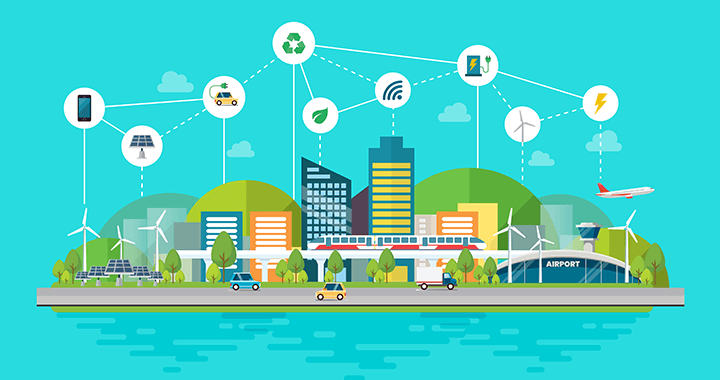In the past, SCADA systems were considered on a building-by-building basis. Now, however, the focus has shifted towards Integrated SCADA solutions or unified control centres. These centres, which manage SCADA for multiple supervised buildings, are rapidly advancing in private infrastructures. But what about cities? With the increasing deployment of intelligent equipment (such as lighting, temperature control, and access systems), urban areas stand to benefit significantly.
Discover how a platform like Panorama can be a valuable asset for creating an optimised, low-carbon, and secure city.
An optimised city
To effectively manage its services, a city must first consolidate as many systems as possible onto a single platform, regardless of distance constraints. This integration simplifies the understanding of what is happening, thus enabling a more precise action plan to be applied. For instance, if a sensor fails, it is crucial to link the video feed from a nearby camera to this incident.
Panorama addresses such challenges with several key strengths:
- Flexibility: The system’s core object technology allows for the seamless integration of services and entire buildings with the developed displays.
- Interoperability: Panorama supports numerous communication protocols, especially those commonly used in commercial buildings. The unified control centre can effortlessly collect, aggregate and relay information in real-time from the city’s various systems and equipment, to the system users.
Optimisation also entails consolidating equipment and personnel. Panorama offers a specialised solution called Edge-to-Service to manage the various SCADA systems deployed throughout the city. This package includes three modules:
- Data Concentrator: Positioned close to the equipment, this module hosts a local SCADA application via the Edge Node.
- Centralised Integrated SCADA Solution: This module unifies real-time site data and provides operators with high-performance control and command interfaces.
- Administration Tool: Acting as the conductor of the system, this tool enables remote management of the installed base and functions as a specialised DevOps tool through the Edge Controller module.
In short, data is gathered and processed locally at its source (Edge Computing) before being securely transmitted via the Edge Controller to the unified control centre. Edge-to-Service allows for comprehensive remote management of a city’s infrastructure: maintenance is streamlined (fewer interventions, reduced manpower), installations become more cost-effective and consistent, and facility management gains flexibility (both centralised and autonomous).
The low-carbon city
An intelligent, optimised city must also prioritise energy efficiency. The information displayed by the unified control centre will be crucial in this regard. Therefore, alongside a SCADA solution, Panorama offers a data historian solution called H2. Leveraging CODRA’s extensive automation expertise, H2 meticulously records data from the equipment.
Once collected, Panorama H2 performs several operations on that data:
- Processing: Filtering and sampling, functions can be applied, and measurements can be combined.
- Data Labelling: Identifying and classifying data within the database.
With this well-structured data, H2 can generate reliable reports, particularly on the energy consumed by the city’s services and facilities. This makes it easier to identify any deviations in usage, thus helping to achieve defined energy efficiency targets.
The secure city
Cities face a dual challenge when it comes to safety and security:
- Physical Security: Over the past twenty years, security systems have become widespread, yet fully leveraging their potential remains challenging.
- Cybersecurity: Local authorities are often prime targets for cyber-attacks, prompting proactive measures. In France, the government’s cyber agency (ANSSI) has identified the water, transport, healthcare, and public administration sectors as Critical Entities.
Panorama integrates a comprehensive range of security equipment and systems, both within buildings and in public spaces:
- Video Protection: Including cameras, Video Management Systems (VMS) and video walls.
- Access Control: Covering doors, gates, barriers and intercom systems.
- Fire Alarms.
With the integration of this equipment, you will achieve a comprehensive Integrated SCADA solution for security, unifying all SCADA systems into a single interface. This consolidation means that only one application is required for all SCADA users, enabling them to better interpret the information and respond more effectively. This approach maximises the value and profitability of investments in video protection.
Regarding cybersecurity, Panorama has achieved CPSN certification from ANSSI, the highest level possible for a SCADA system in France. Panorama incorporates several essential cybersecurity features to secure a unified control centre:
- Encrypted Communication Protocols: These certificate-based protocols ensure secure communication between various system components (Controllers, servers, clients).
- External Directory: Panorama users can be registered in an external directory (Active Directory/LDAP), allowing a trusted third party to maintain the confidentiality of login data.
- Network Wizard: this tool helps you to set the security parameters for exchanges between different objects.
More than just a SCADA system, the unified control centre will be essential for the city of the future. After a long phase of investment in ‘intelligent’ systems and equipment, it’s time for cities to make the most of their potential: to control these more easily, to retrieve all the information they produce, and to make teamwork between operators more productive and efficient. This way, cities will be equipped with valuable tools to enhance management, reduce carbon emissions, and secure their infrastructures.






